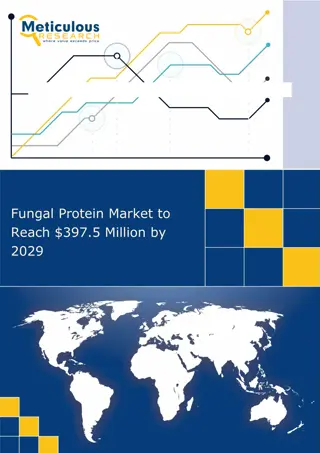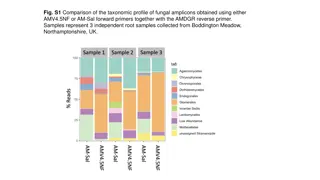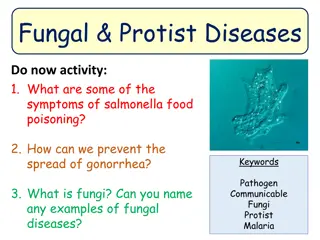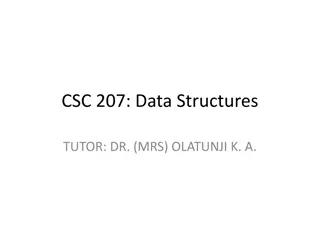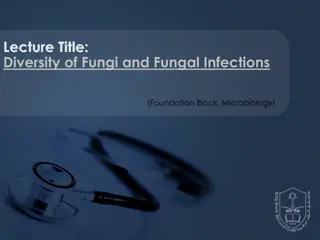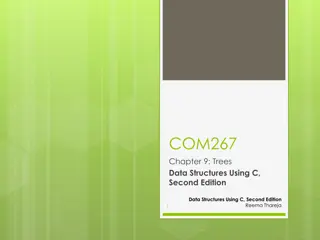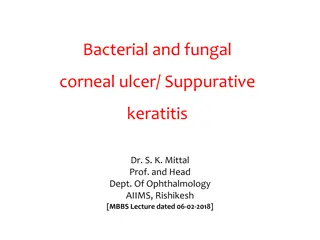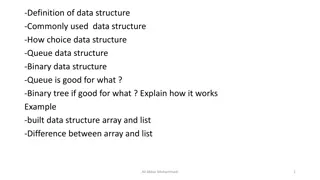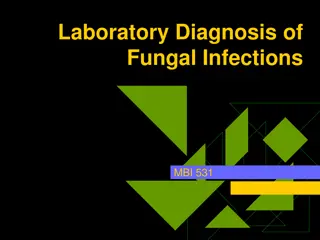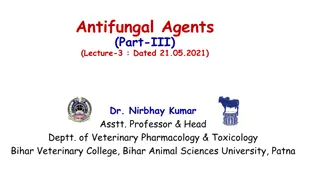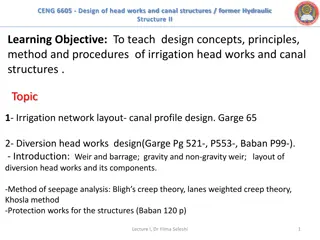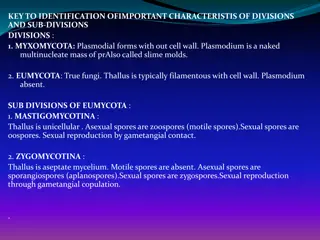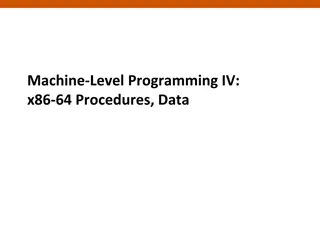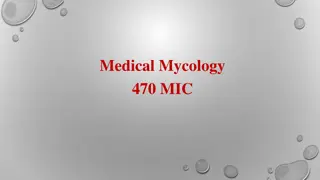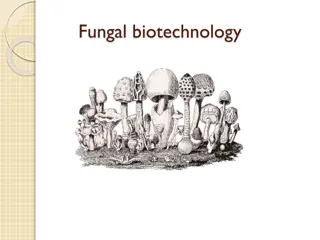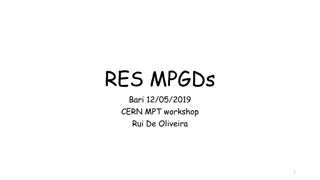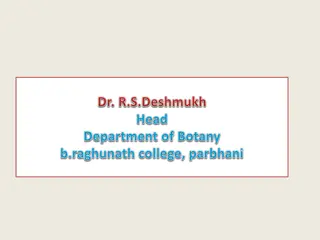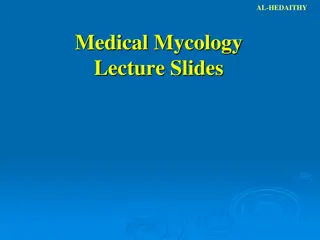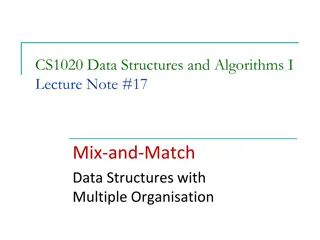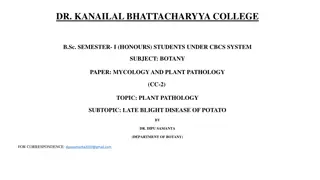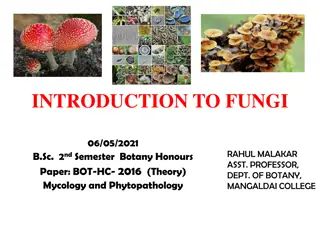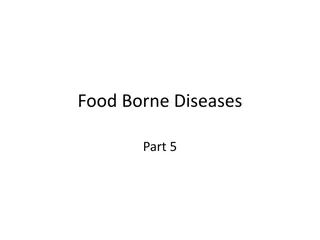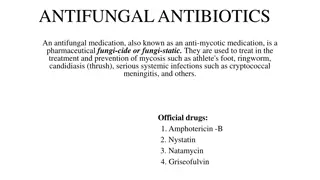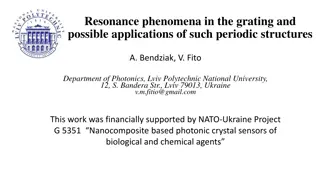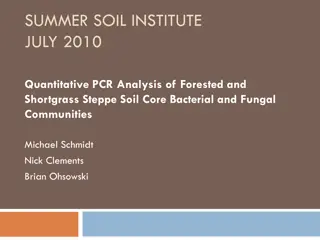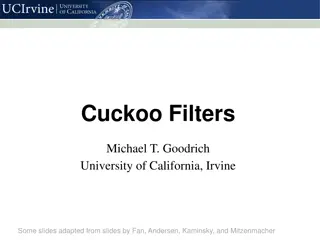FUNGAL SPECIES AND THEIR TOXINS.
Explore the world of fungal species and their toxins as studied by Prof. Abdullah Msaad Al-Falih at King Saud University's College of Science. Discover over 500 mycotoxins, including aflatoxins, ochratoxins, trichothecenes, fumonisins, sterigmatocystin, ergot alkaloids, zearalenone, Alternaria toxin
2 views • 8 slides
Estimation of Serious Mycoses Burden in Indonesia
This study estimates the burden of serious fungal infections in Indonesia, a country with rich biodiversity and limited medical mycology facilities. The data indicates a high prevalence of opportunistic infections in AIDS patients and TB cases, with Candidiasis and Cryptococcosis being significant c
2 views • 29 slides
Understanding Fungal Microorganisms and Their Impact on Human Health
Fungal microorganisms, including yeast and mold, play crucial roles in the human body's ecosystem. They can be both beneficial and harmful, influencing conditions like candidiasis and mycoses. Learn about the diverse forms and functions of eukaryotic organisms, their morphology, and the transition b
8 views • 33 slides
Overview of Superficial Fungal Infections of the Skin
Superficial fungal infections of the skin are categorized into superficial, cutaneous, and subcutaneous types. Superficial mycoses affect the stratum corneum and include conditions like tinea versicolor, tinea nigra, and piedra. Tinea versicolor is a chronic infection caused by Malassezia furfur, wh
3 views • 31 slides
Forecasted: Fungal Protein Market to Surpass $397.5 Million by 2029
Explore $397.5 million fungal protein market: Get exclusive insights on key market trends, segments, geographical analysis, & competitive analysis!\n
1 views • 3 slides
Fungal Diversity Analysis in Wheat Roots Using Different Primers
Comparison of fungal taxonomic profiles in wheat roots using different primers, showcasing relative abundances of Glomeromycotina and Mucoromycotina orders in different treatments and varieties. Box plots demonstrate ASV evenness, observed ASV numbers, and Shannon diversity index, revealing insights
0 views • 5 slides
Effective Coordinating Structures for Response Operations
Operational coordination involves actions and activities to enable decision-makers to determine appropriate courses of action for various incidents, including homeland security operations. Coordinating structures help organize response efforts to address mission requirements, improve access to resou
3 views • 19 slides
Understanding Fungal and Protist Diseases: Impacts and Prevention
Fungi and protists play significant roles as pathogens, causing diseases in both humans and plants. Fungal diseases like athletes foot and protist diseases like malaria can have serious impacts on health. Control measures such as understanding symptoms, spread mechanisms, and prevention strategies a
0 views • 10 slides
Understanding Data Structures in CSC 207 with Dr. Olatunji K. A.
This course covers the objectives, learning outcomes, and contents related to data structures in CSC 207. Students will learn about data type specifications, representation techniques, algorithm analysis, recursive methods, and practical applications of data structures. The course delves into basic
1 views • 22 slides
Understanding Fungi Diversity and Infections in Microbiology
Explore the world of fungi and fungal infections in this foundation block of microbiology. Learn about medically important yeasts, mold fungi, major fungal diseases, antifungal agents, and infection acquisition methods. Dive into hypersensitivity reactions, mycotoxicoses, and various types of fungal
1 views • 19 slides
Understanding Control Structures in Programming
Control structures in programming allow programmers to manage the flow of execution with selection/decision and repetition/loop structures. This chapter explores different types of selection control structures like if, if-else, nested if-else, and switch-case statements, providing examples and exerc
2 views • 30 slides
Exploring Trees Data Structures Using C - Second Edition
Learn about trees data structures in the context of programming using the C language. This comprehensive guide covers topics such as types of trees, tree creation, traversal, basic terminologies, and different tree structures like binary trees and binary search trees. Dive into the world of trees da
2 views • 54 slides
Overview of Bacterial and Fungal Corneal Ulcer
Bacterial and fungal corneal ulcers, known as suppurative keratitis, are a significant cause of blindness, included in national blindness control programs. They result from infections by exogenous organisms like S. aureus, S. pneumoniae, Aspergillus, and Candida. Predisposing factors include trauma,
0 views • 28 slides
Understanding Data Structures: A Comprehensive Overview
Data structures are schemes for organizing data in a computer's memory, influencing program performance. Common structures like queues and binary trees are outlined, illustrating their organization and use cases. The choice of data structures impacts task efficiency, with programmers analyzing data
0 views • 20 slides
Laboratory Diagnosis of Fungal Infections: Specimen Collection and Transport
In the laboratory diagnosis of fungal infections, proper collection and transportation of specimens are crucial for accurate diagnosis and treatment. Different sites and types of specimens require specific collection techniques to avoid contamination and ensure viability. From superficial to systemi
0 views • 29 slides
Understanding Azole Antifungal Agents for Veterinary Use
Azole antifungal agents play a crucial role in treating fungal infections in veterinary medicine. Imidazoles like clotrimazole and triazoles like fluconazole are commonly used for their fungistatic properties. These agents inhibit fungal enzymes, disrupting membrane fluidity and inhibiting cell repl
0 views • 14 slides
Design of Head Works and Canal Structures - Learning Objectives and Evaluation
This course covers the design concepts, principles, methods, and procedures related to the design of irrigation head works and canal structures. Topics include irrigation network layout, diversion head works design, seepage analysis methods, protection works, canal profile design, canal head regulat
0 views • 4 slides
Key Characteristics of Fungal Divisions and Sub-Divisions
Identification key for important characteristics of fungal divisions and sub-divisions, including Myxomycota and Eumycota, with detailed descriptions of sub-divisions such as Mastigomycotina, Zygomycotina, Ascomycotina, Basidiomycotina, and Deuteromycotina. Focus on distinguishing features, reproduc
0 views • 13 slides
Impacts of Brassica Removal on Plant and Fungal Communities
Study on methods of Brassica removal in Coastal Sage Scrub ecosystems, evaluating effects on plant and fungal communities. Results show differences in vegetation cover, species composition, and fungal biomass with various removal techniques like herbicide, mowing, and hand-weeding.
0 views • 19 slides
Understanding x86-64 Procedures and Data Structures
This content provides insights into x86-64 programming, covering topics such as procedures, integer registers, stack frames, locals in the red zone, interesting features of stack frames, arrays, multi-dimensional structures, and more. It dives into the usage conventions of integer registers, the all
0 views • 44 slides
Fungal Microbiology Laboratory Procedures
This content provides detailed guidelines on fungal culture purification, subculturing process, preparation of microscopic slides for fungal micromorphology assessment, and isolation of human samples for diagnosing fungal infections. The procedures include steps for identifying characteristics of in
1 views • 9 slides
Exploring the World of Fungal Biotechnology
Fungal biotechnology involves utilizing living organisms like fungi for industrial applications, leading to the production of various valuable products such as enzymes, vitamins, and secondary metabolites. This field not only benefits industries by offering energy-efficient processes but also contri
0 views • 15 slides
Innovative Resistive Layers and Structures for Particle Detection at CERN
Explore the latest advancements in resistive layers and structures designed for particle detection at CERN. The research covers various types of resistive structures, including GEM and BULK Micromegas, and delves into topics such as spark protection, energy levels, and material vaporization. Detaile
0 views • 39 slides
Understanding Looping Structures in PHP
Looping structures are essential in programming for writing iteration logics. This article delves into the importance of looping structures, different types in PHP, and creating basic logic using loops like for, while, for each, and do-while. Learn the syntax, parameters, examples, and flow charts t
0 views • 23 slides
Introduction to Lichens: General Overview, Classification, and Economic Importance
Lichens are symbiotic organisms composed of fungi and algae, with the algal component synthesizing food while the fungal component provides structure. They have unique characteristics and are classified based on their fungal partner, thallus forms, and habitat. Ascolichens and Basidiolichens are two
0 views • 24 slides
Comprehensive Overview of Medical Mycology and Fungal Structures
Explore the field of medical mycology through lecture slides by AL-HEDAITHY covering various topics such as basic mycology, superficial mycoses, primary systemic mycoses, fungal structures, and reproduction in fungi. Dive into details about different fungal infections, their characteristics, forms o
0 views • 94 slides
Understanding Ringworm: Symptoms, Treatment, and Prevention
Ringworm, a common fungal infection, manifests as small, reddish, itchy patches that form ring-shaped lesions on the skin. It is contagious and can recur over many years if left untreated. Effective treatment involves anti-fungal topical creams or oral prescriptions in severe cases. Exclusion from s
0 views • 42 slides
Mix and Match Data Structures for Efficient Algorithms
Discover how to combine basic data structures like arrays, linked lists, and trees to create specialized data structures for various applications. Explore the concept of mix-and-match data structures with multiple organizations to implement efficient algorithms like adjacency lists and matrices for
0 views • 12 slides
Late Blight Disease of Potato: Symptoms and Management
Late blight is a severe fungal disease affecting potatoes worldwide, causing foliage damage, reduced tuber yield, and decay. It is caused by Phytophthora infestans and manifests as brownish-black lesions on plant parts. The disease spreads rapidly under humid conditions, leading to blighting of foli
0 views • 8 slides
General Characteristics of Fungi and Mycology Overview
Fungi, diverse eukaryotic organisms, exhibit various characteristics such as heterotrophic nature, distinct cell wall composition, and different modes of reproduction. Mycology, the study of fungi, delves into their classification and functions. Fungal cells may be unicellular or filamentous, with m
0 views • 15 slides
Understanding Fungal Skin Infections and Eczema/Dermatitis
Learn about fungal skin infections like Athlete's foot and ways to manage them, including symptoms, treatment options, and when to seek medical attention. Additionally, explore common skin conditions such as eczema and dermatitis, their causes, and typical symptoms in this informative guide.
0 views • 34 slides
Performance Analysis of Synchronization Methods in Concurrent Data Structures
Explore the impact of synchronization methods on the performance and behavior of concurrent data structures in multithreaded applications. The study involves developing and implementing concurrent data structures, analyzing coarse-grain locking, fine-grain locking, lock-free mechanisms, and assessin
0 views • 25 slides
Understanding Structures and Unions in C Programming
Exploring the concept of structures and unions in the C programming language, this reference material covers their definition, initialization, assignment, members, arrays, and nested structures. Learn how structures aggregate data types and how unions can share memory locations. Gain insights into s
0 views • 20 slides
Understanding Fungal and Chemical Food-Borne Intoxications
Fungal intoxications are caused by mycotoxins produced by fungi in improperly stored food, with aflatoxicosis being a significant concern. Aflatoxins can lead to acute hemorrhagic syndromes and long-term liver tumors. Prevention strategies include proper drying and storage of foods. Chemical food-bo
0 views • 19 slides
Understanding Nasal Polypi and Their Classifications
Nasal polyps are simple oedematous growths in the nasal mucosa that can be unilateral or bilateral. They are classified into simple nasal polyps, fungal polyps, and malignant polyps. Simple nasal polypi, also known as inflammatory polyps, include ethmoidal polyps and antrochoanal polyps. Fungal poly
0 views • 18 slides
Understanding Antifungal Inhibitors and Drugs
In this detailed overview, we explore antifungal inhibitors and drugs, including their mechanisms of action, impact on eukaryotes and prokaryotes, common agents affecting fungal sterols and cell walls, as well as synthetic antifungals. From polyenes like nystatin to azoles such as voriconazole, this
0 views • 12 slides
Overview of Antifungal Antibiotics and Their Uses
Antifungal antibiotics are crucial medications used to treat and prevent various fungal infections such as athlete's foot, ringworm, candidiasis, and systemic infections like cryptococcal meningitis. This article discusses key antifungal medications including Amphotericin-B, Nystatin, Natamycin, and
0 views • 6 slides
Resonance Phenomena in Grating Structures and Applications
Resonance phenomena in grating structures, such as dielectric or metal gratings on substrates, offer sensitive elements for detecting biological and chemical agents. The sensitivity of these structures is described by equations relating to resonant wavelength changes and the refractive index of inve
0 views • 20 slides
Analysis of Bacterial and Fungal Communities in Forested and Shortgrass Steppe Soil
The study conducted in July 2010 at the Summer Soil Institute involved a Quantitative PCR analysis of bacterial and fungal communities in Forested and Shortgrass Steppe Soil. The research compared the microbial DNA extracted from different sites and depths in these ecosystems, using techniques such
0 views • 14 slides
Overview of Bloom Filters and Succinct Data Structures
Bloom filters and succinct data structures are efficient data structures used for set-membership tests and approximate queries. Bloom filters offer compact storage for set membership with a trade-off in accuracy, while succinct data structures aim to balance high performance, low space cost, and sup
0 views • 22 slides




